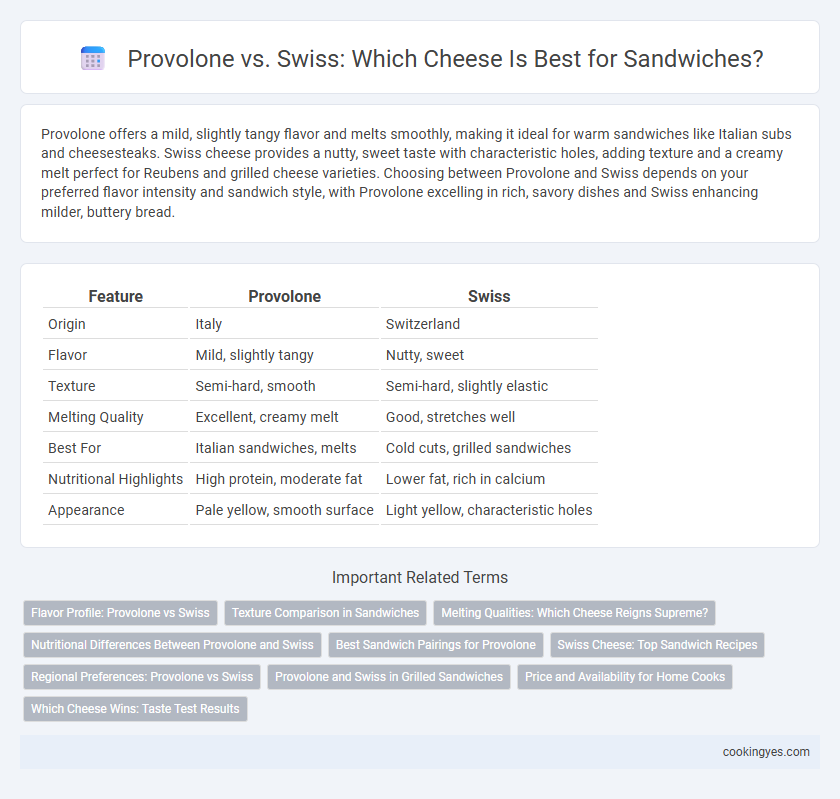Provolone offers a mild, slightly tangy flavor and melts smoothly, making it ideal for warm sandwiches like Italian subs and cheesesteaks. Swiss cheese provides a nutty, sweet taste with characteristic holes, adding texture and a creamy melt perfect for Reubens and grilled cheese varieties. Choosing between Provolone and Swiss depends on your preferred flavor intensity and sandwich style, with Provolone excelling in rich, savory dishes and Swiss enhancing milder, buttery bread.
Table of Comparison
| Feature | Provolone | Swiss |
|---|---|---|
| Origin | Italy | Switzerland |
| Flavor | Mild, slightly tangy | Nutty, sweet |
| Texture | Semi-hard, smooth | Semi-hard, slightly elastic |
| Melting Quality | Excellent, creamy melt | Good, stretches well |
| Best For | Italian sandwiches, melts | Cold cuts, grilled sandwiches |
| Nutritional Highlights | High protein, moderate fat | Lower fat, rich in calcium |
| Appearance | Pale yellow, smooth surface | Light yellow, characteristic holes |
Flavor Profile: Provolone vs Swiss
Provolone cheese offers a mild, slightly tangy flavor with a smooth and creamy texture, making it versatile for various sandwich styles. Swiss cheese features a nutty, slightly sweet taste with characteristic holes and a firm yet pliable texture, adding a distinct richness to sandwiches. The choice between Provolone and Swiss depends on the desired flavor intensity and overall sandwich profile.
Texture Comparison in Sandwiches
Provolone cheese offers a smooth, creamy texture that melts evenly, enhancing sandwich moisture without overpowering the bread's crunch. Swiss cheese features a firm yet pliable texture with distinctive holes, providing a slightly springy bite that maintains structure when heated. Both cheeses complement sandwiches differently, with Provolone delivering rich meltability and Swiss offering a unique chewiness and resistance to sogginess.
Melting Qualities: Which Cheese Reigns Supreme?
Provolone exhibits superior melting qualities with its smooth, creamy texture that transforms into gooey perfection, ideal for hot sandwiches. Swiss cheese, while flavorful with its nutty taste, melts more slowly and can become oily, making it less consistent for even melting. For sandwiches requiring a velvety, uniform melt, provolone reigns supreme in culinary versatility and meltability.
Nutritional Differences Between Provolone and Swiss
Provolone cheese contains approximately 98 calories and 7 grams of protein per ounce, making it a moderately rich source of protein with about 7 grams of fat and 22 mg of calcium. Swiss cheese typically has around 110 calories, 8 grams of protein, 8 grams of fat, and a higher calcium content at about 270 mg per ounce. The lower sodium content in Swiss cheese compared to Provolone makes it a preferable option for health-conscious sandwich lovers aiming for balanced nutrition.
Best Sandwich Pairings for Provolone
Provolone pairs exceptionally well with Italian cold cuts like salami, ham, and mortadella, enhancing the sandwich with its mild, slightly tangy flavor. Its smooth, creamy texture melts perfectly in hot sandwiches such as a classic Philly cheesesteak, complementing sauteed peppers and onions. Provolone also balances well with fresh vegetables like arugula and roasted red peppers, making it ideal for both deli and grilled sandwiches.
Swiss Cheese: Top Sandwich Recipes
Swiss cheese, known for its mild, nutty flavor and distinctive holes, melts smoothly, making it ideal for a variety of sandwiches like classic Reuben, turkey and avocado, or ham and Swiss paninis. Its creamy texture complements both cold cuts and grilled ingredients, enhancing flavor without overpowering other components. Popular sandwich recipes featuring Swiss cheese highlight its balance of taste and meltability, appealing to those seeking a versatile, savory option.
Regional Preferences: Provolone vs Swiss
Provolone cheese is predominantly favored in Southern and Midwestern United States for sandwiches due to its mild, slightly tangy flavor that complements Italian-style deli meats. Swiss cheese enjoys greater popularity in the Northeastern and Western regions, appreciated for its nutty taste and characteristic holes, which add texture and a subtle sweetness to turkey or ham sandwiches. Regional preferences are shaped by local culinary traditions, with Provolone aligning with Italian-American cuisine while Swiss pairs well with classic deli sandwich styles.
Provolone and Swiss in Grilled Sandwiches
Provolone cheese melts smoothly with a mild, slightly tangy flavor, making it ideal for grilled sandwiches that require a creamy texture and balanced taste. Swiss cheese offers a nutty, slightly sweet profile and melts into a gooey consistency that enhances the overall richness of grilled sandwiches. Both cheeses complement ingredients like ham and turkey, but Provolone's subtle sharpness pairs especially well with savory fillings, while Swiss adds depth with its distinctive taste.
Price and Availability for Home Cooks
Provolone cheese is generally more affordable and widely available in most grocery stores, making it a budget-friendly choice for home cooks crafting sandwiches. Swiss cheese, while slightly pricier, offers a distinct nutty flavor and is commonly found in specialty or larger supermarkets. Both cheeses melt well, but provolone's accessibility and cost-effectiveness make it a preferred option for everyday sandwich preparation.
Which Cheese Wins: Taste Test Results
Provolone offers a rich, smoky flavor with a mild tang that melts smoothly, making it ideal for hot sandwiches like Italian subs. Swiss cheese delivers a nutty, slightly sweet taste with distinctive holes and a firmer texture, perfect for cold sandwiches and melts. Taste tests reveal provolone wins for warm, savory sandwiches due to its melting properties, while Swiss excels in providing unique flavor and texture in cold, layered sandwiches.
Provolone vs Swiss for Sandwiches Infographic

 cookingyes.com
cookingyes.com